The reviews for the AMD Radeon RX 7800 XT and 7700 XT GPUs are out. While RX 7800 XT is promising in the reviews, 7700 XT seems overpriced by AMD.
A few days ago, AMD announced the Radeon RX 7800 XT and RX 7700 XT graphics cards, along with details about the upcoming FSR3.
In it, AMD claimed that the $499 RX 7800 XT with 16GB is faster than the $599 Nvidia GeForce RTX 4070 12GB.
It was also claimed that the $449 RX 7700 XT with 12GB is faster than the $499 Nvidia GeForce RTX 4060 Ti 16GB.
But are the claims true? Today, the reviews for both graphics cards are officially out. So let’s check some of them.
Tom’s Hardware
AMD Radeon RX 7800 XT

Tom’s Hardware reviewed the AMD Radeon RX 7800 XT graphics card.
In pure rasterization performance at 1440p (for what this graphics card is made for), the RX 7800 XT performed very similarly to the RX 6800 XT ($649 MSRP), with just a 4% difference.
When compared to the Nvidia GeForce RTX 4070, the AMD RX 7800 XT was 7% faster. Which means AMD’s claims were indeed true. Additionally, if the similarly priced RTX 4060 Ti 16GB is taken into consideration, then it’s a huge 40% faster.
However, if raytracing performance is considered, then the RX 7800 XT lags a lot like other AMD cards. RT is where the RTX 4070 is 27% faster than the RX 7800 XT. Also, RX 7800 XT is just 6% faster than RTX 4060 Ti 16GB in same. However, it improves by 8% against the previous-gen RX 6800 XT.

As far as power usage is concerned, AMD RX 7800 XT used 250W max. Which is 44W lesser than AMD RX 6800 XT, which used 294W. However, RTX 4070 was more efficient at just 190W.
AMD Radeon RX 7700 XT
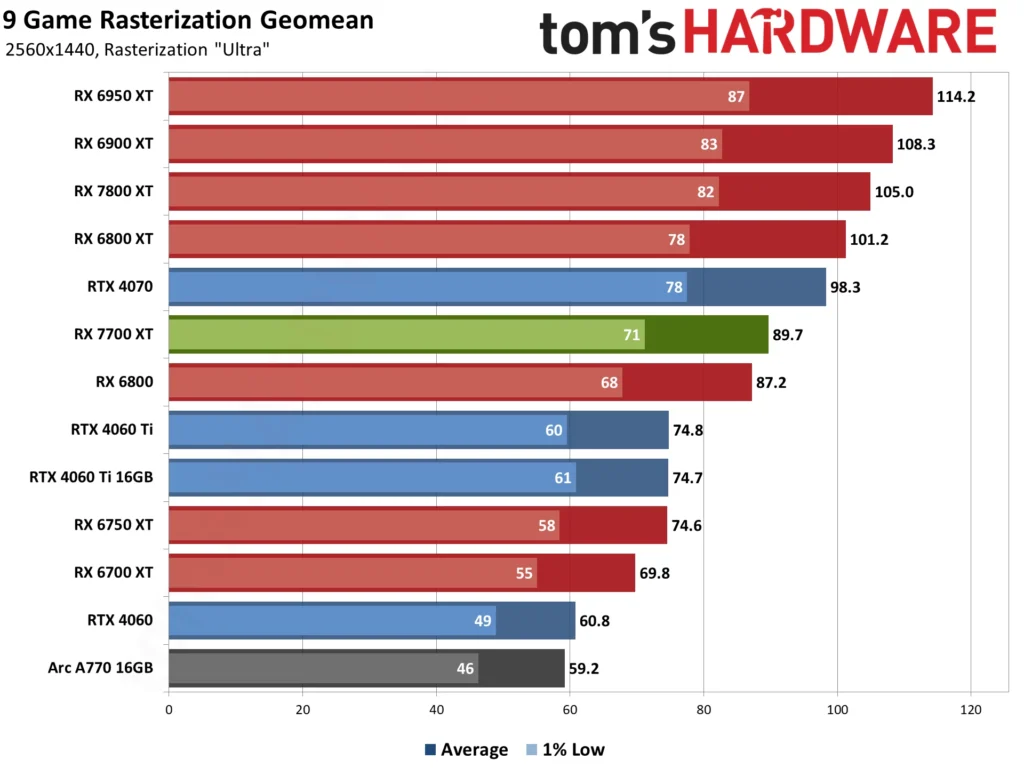
Tom’s Hardware also reviewed the AMD Radeon RX 7700 XT. As AMD hasn’t made a reference model for the RX 7700 XT, they have used the XFX Radeon RX 7700 XT QICK 319 for their review.
In rasterization performance at 1440p, the $449 AMD RX 7700 XT is just 3% faster than the RX 6800 ($579 original MSRP). However, it’s 20% faster than the Nvidia RTX 4060 Ti 16GB ($499), which AMD is marketing this card against.
In raytracing alone, the RX 7700 XT is slightly faster than the RX 6800. However, the RTX 4060 Ti 16GB is easily faster than the RX 7700 XT in RT.
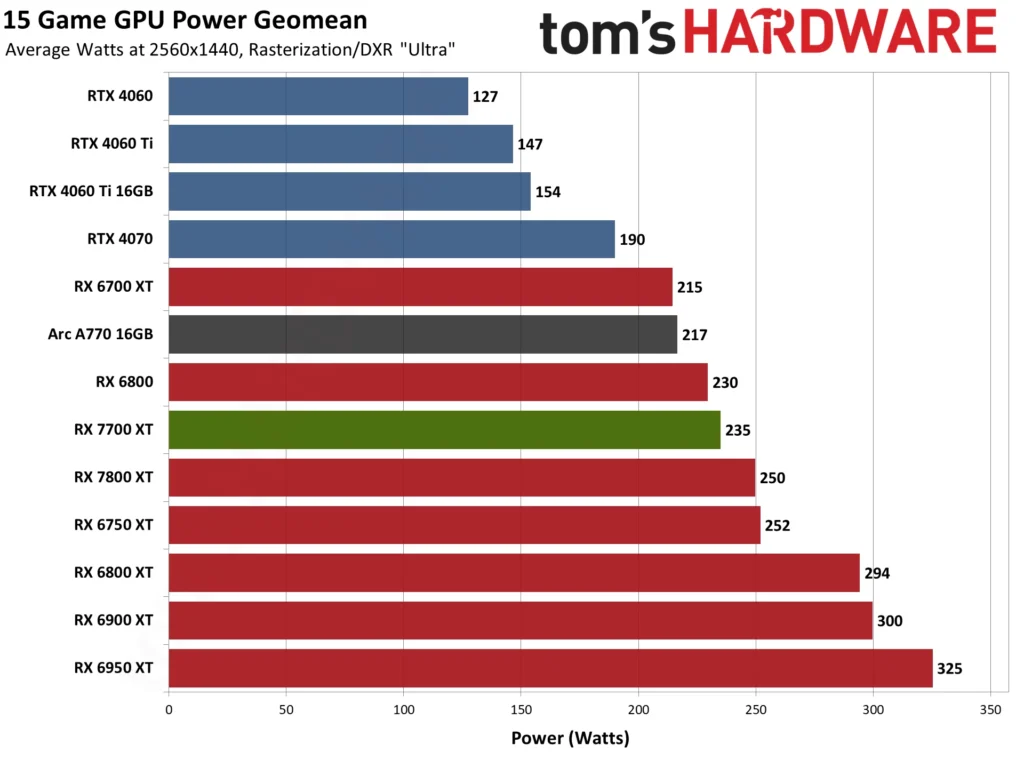
In terms of power usage, the RX 7700 XT uses 235W, which is 5W higher than the RX 6800, however, it’s a massive 81W more than the RTX 4060 Ti 16GB.
TechSpot
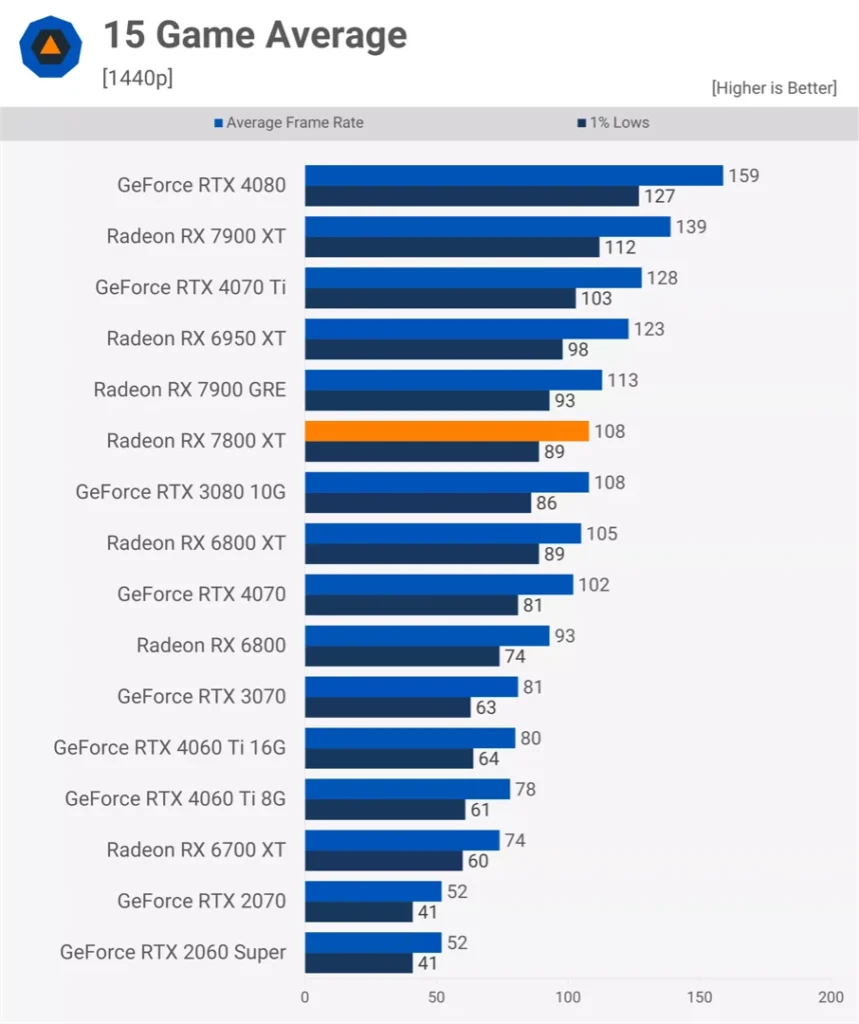
At the time of writing this article, TechSpot tested only the AMD Radeon RX 7800 XT by XFX. For the record, this is a written review by the guys at Hardware Unboxed (YouTube), who have tested the card.
In average performance at 1440p, the RX 7800 XT is similar to the RX 6800 XT and the Nvidia RTX 3080 8GB, while beating the expensive RTX 4070 by 3%. Interestingly, it’s only slightly slower than the AMD Radeon RX 7900 GRE.
In raytracing alone, the RX 7800 XT is 5% faster than the RX 6800 XT at 1440p but 9% slower than the RTX 4070.
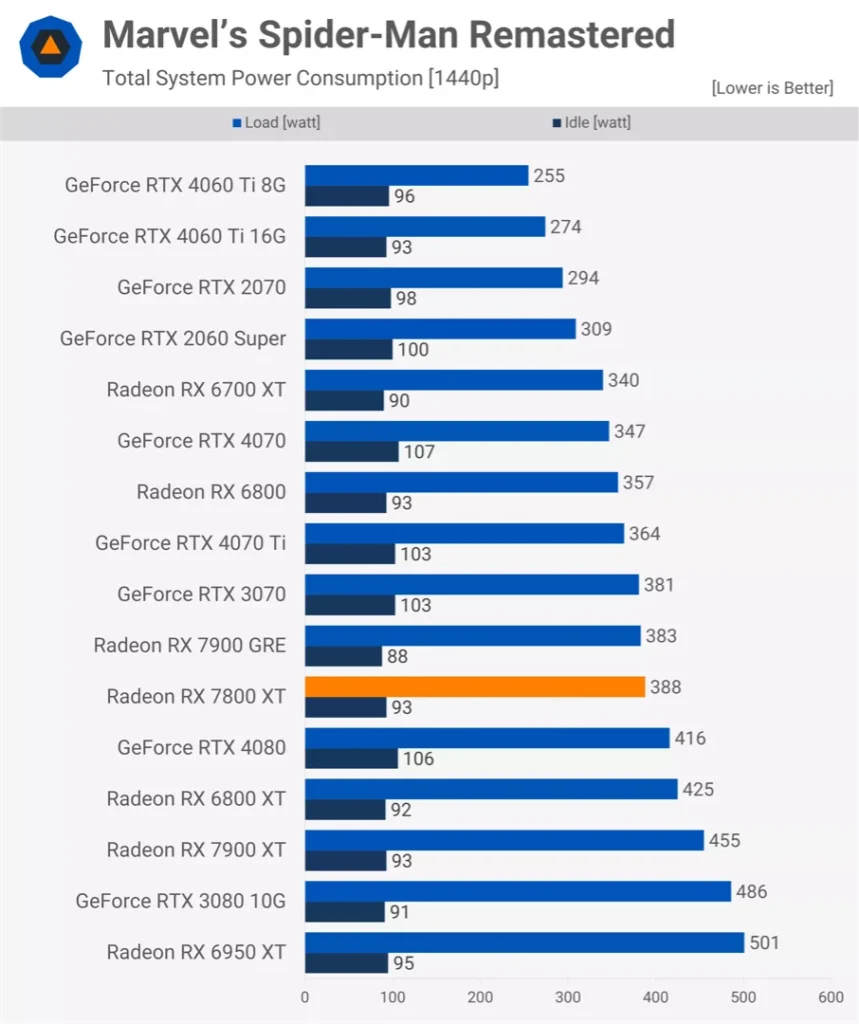
In terms of overall power consumption, the RX 7800 XT based computer used 388W in a game, which is 37W lower than the previous-gen RX 6800 XT. However, it used about 40W more than the RTX 4070.
However, Steve Walton of TechSpot / Hardware Unboxed, who strongly criticizes every bad card, praises the pricing of this card. Making it among the best graphics cards in cost per frame at 1440p.
TechPowerUP
AMD Radeon RX 7800 XT
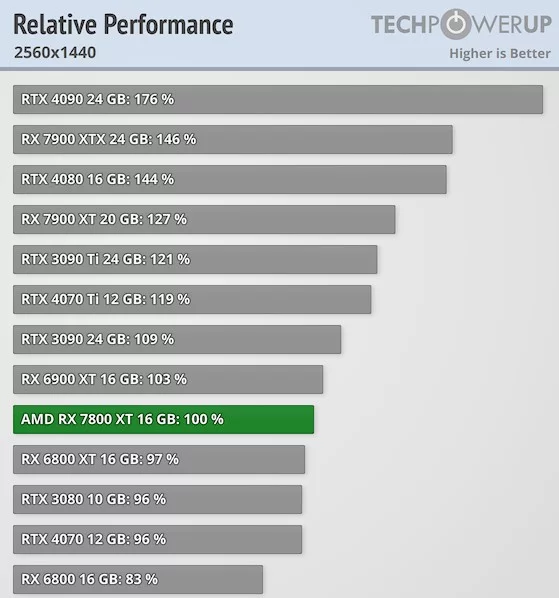
TechPowerUP also tested the AMD Radeon RX 7800 XT. As always, TechPowerUP has very extensive reviews. We recommend everyone to read it.
At 1440p, the RX 7800 XT is just 3% slower than the RX 6900 XT. The RX 7800 XT is also 3% faster than the 6800 XT and 4% faster than the RTX 3080 and RTX 4070.
However, in raytracing things change a little bit. The RX 7800 XT is 14% slower than the RTX 4070. But, it’s a big 8% faster than the previous-gen RX 6800 XT in raytracing.
In terms of power usage at 1440p, TechPowerUP’s findings were similar to those of Tom’s Hardware. The RX 7800 XT used 250W, which is 48W lower than the RX 6800 XT and about 50W higher than the RTX 4070.
AMD Radeon RX 7700 XT
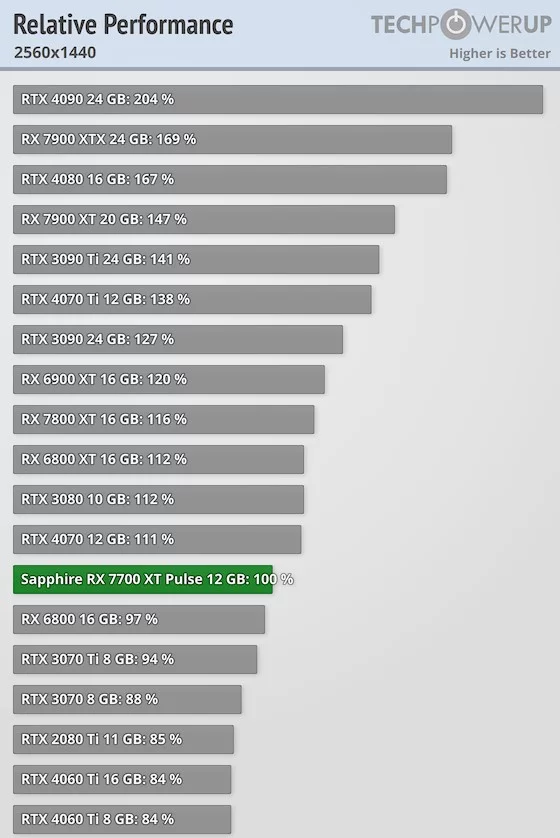
TechPowerUP also tested the Sapphire AMD Radeon RX 7700 XT. Again, this is as detailed as the RX 7800 XT, so everyone is advised to go through it.
At 1440p, the RX 7700 XT is 16% slower than the RX 7800 XT and 11% slower than the RTX 4070. However, it’s 3% faster than the RX 6800 (non-XT) and a massive 16% faster than the RTX 4060 Ti 8GB and 16GB.
In raytracing, again, the scenario changes. The RX 7700 XT has similar performance to that of both the RTX 4060 Ti versions, but is 7% faster than the RX 6800.
In terms of power usage, the RX 7700 XT uses about 230W in gaming at 1440p, which is a few watts lower than the RX 6800. However, it’s still 60W above the extremely efficient RTX 4060 Ti 16GB.
Conclusion
While we have covered only three, there have been many who have reviewed these cards. It includes our friends at Club386 (RX 7800 XT), Gamers Nexus (RX 7800 XT and RX 7700 XT, YouTube) and also KitGuru (RX 7800 XT and RX 7700 XT). Not to forget, various versions of these cards were tested by TechPowerUP themselves.
Overall, the opinion is unanimous, though. The AMD Radeon RX 7800 XT graphics card is similar to or only slightly faster than the 6800 XT. However, where it shines is in pricing. The RX 6800 XT was released at $649 and the RT 7800 XT had released at $499.
So while the RX 6800 XT costs similar now, basically the RX 7800 XT replaces the 6800 XT with some extra added features like AV1 encoding and possible support for the new Radeon RX 7000 series exclusive features. Additionally, it has some good improvements in the raytracing performance and also in the power usage.
Also, AMD’s claims about the $499 RX 7800 XT being faster than the Nvidia RTX 4070 do stand true if raytracing performance isn’t considered.
However, the second card, the RX 7700 XT at $449 is a slight disappointment. It’s being shown as a competitor to the $499 RTX 4060 Ti 16GB, but the 8GB model, which performs the same but costs just $399. So for the RX 7700 XT to be competitive, it needs to be priced at $399, which is $50 cheaper for everyone.
Sure, RX 7700 XT does come with some improvements of it’s own. But such a high price at $449 isn’t justified for the performance it delivers in this generation of graphics cards.


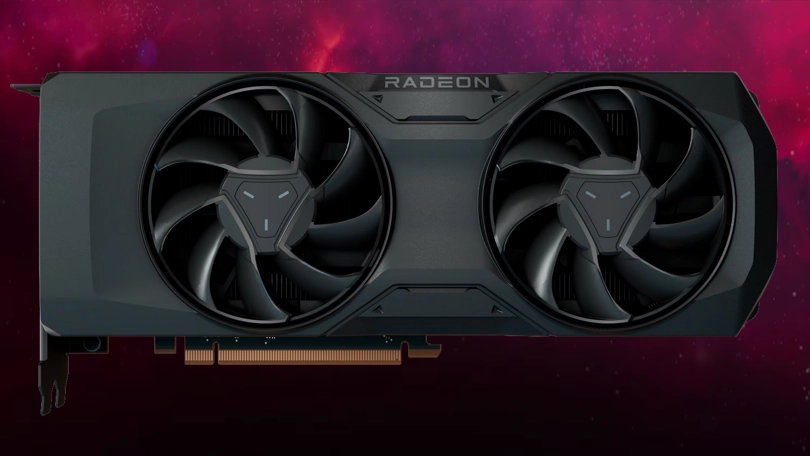
3175x175(CURRENT).thumb.jpg.b05acc060982b36f5891ba728e6d953c.jpg)
Recommended Comments
There are no comments to display.
Join the conversation
You can post now and register later. If you have an account, sign in now to post with your account.
Note: Your post will require moderator approval before it will be visible.